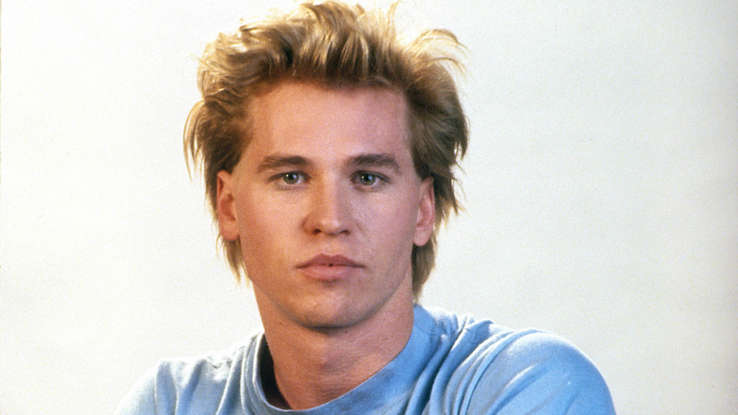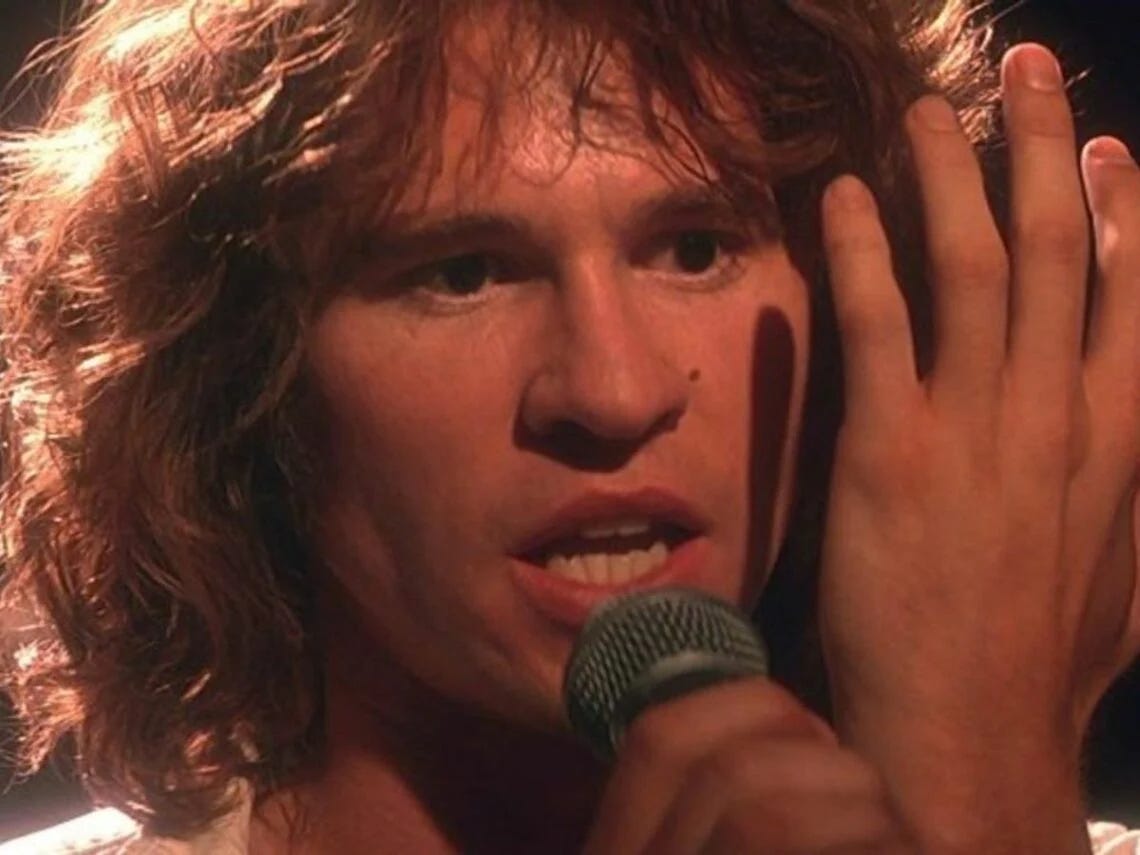
Nice to see some great tributes to Val Kilmer rolling in (and this one in particular, by Esther Zuckerman in the New York Times, where she offers the astute and, to me, near-perfect assessment that Kilmer is “best thought of as a character actor trapped in a leading man’s body”).
Of course, it’s impossible to summarize Val’s career without mentioning, if not beginning with, Top Gun—the biggest, ugliest, elephant (a very grotesque Republican elephant, naturally) in the room. He was ideal as the villainous Iceman, and while a right-side up Hollywood needed Tom Cruise and all the ways this would turn his career into one of those F-14 Tomcats—and simultaneously propel another, larger movie in progress (the Reagan Administration) further into the stratosphere, equal parts Hollywood gloss and CIA skullduggery, but undeniably a big budget affair, a blockbuster made in the U.S.A. (My succinct review of this film and the era it memorialized here—scroll down to #14 on the list)—in a more (or less?) imaginative simulation, Kilmer would have been cast as the hero and Tom Cruise the scheming, overcompensating striver. Wait, maybe it worked out exactly right, for once.
Kilmer could have and perhaps should have been anything he wanted, but he lacked Cruise’s sandblasted charisma, connections, and the darkest secrets Scientology provides cover for, so he became the occasional star who, like Neil Young after Harvest, found his more rewarding opportunities in the ditch. He also, by many accounts, became an insufferable prima donna and directors remained wary. In short, it wasn’t meant to be, so Kilmer eased into the role of eccentric and brilliant crazy uncle status, equal parts latter stage Marlon Brando, Mickey Rourke, a better-looking Steve Buscemi with more range but heavier on the strange.
It’s difficult for me to relay the combination of excitement, anticipation, and dread that accompanied the lead-up to his once-in-a-lifetime opportunity to play the Lizard King on the big screen (something that had been breathlessly discussed in rock mags and boys locker rooms for years). The hype was, at least in pre-Internet America, volcanic, blood in the streets up to our anklesas we waited, fan boys and fan girls, to see if Oliver Stone was the guy to pull of the impossible. Answer: yes, and no. No, he could not deliver a compelling or focused celebration of the Lizard King. Yes, Stone was forever up to the challenge of exorcising personal demons and anxieties on the silver screen for all of us to suffer through. At once hysterical in all the worst ways, over the top as only Stone could be, and muddled by a guy who still felt cheated that he went to Vietnam instead of overdosing on Haight-Ashbury, Stone’s “vision” was miraculous in that it combined the puerility of an adolescent with a crush and the inexperienced poseur who finds in Morrison’s poetry the wisdom of the ages.

But Val gave it the old college try, and he left it all on the fiery field: his impersonation (embodiment?) of Mr. Mojo Risin is uncanny, at times astonishing, and all in the very ironic service of immortalizing everything awful about Jim Morrison, the artist and human being. It was like Oliver Stone read the purple prose of No One Here Gets Out Alive and thought “Couldn’t we have had a little less about the music and more comparisons to Dionysus and William Blake? Surely there was more drink and drugging on offer?” If anyone but Kilmer had inhabited the role, the film would have been unwatchable. It is, then, to his credit that he carries the mad-libbed script on his sexy shoulders and makes it an enduring hate watch.
(Much, much more about the band, the movie, and Morrison.)
Of course, no tribute would be possible without including his—and there’s no other word for it—miraculous performance as Doc Holliday in Tombstone. Fortunately, every tribute is, appropriately, including his miraculous performance as Doc Holliday, so I’m not sure what more I can offer (I mean we’ve all seen it, and we all adore it, right?) other than: most actors, including if not especially ones with more dough and shiny trophies, would sacrifice years of their lives to possess a modicum of the talent, drive, and dedication to craft Kilmer called on to make a larger than life character live even larger.
(Incidentally, folks tend to insist Kilmer has all the great lines in Tombstone. It’s true he has most of the great lines (and moments) but there is a generous buffet on offer. Kurt Russell acquits himself wonderfully when, less than ten minutes in, he horse whips the man abusing the stud, and then bitch slaps a (then unknown and perfectly cast) Billy Bob Thornton (“Skin that smoke wagon and see what happens… I said throw down, boy!”), and Michael Biehn, who never gets enough love for his work here as Johnny Ringo (or his immortal performance in The Terminator), is effulgent. Heck, Sam Elliott’s mustache does better work than the assembled cast of the concurrently released dud Wyatt Earp—featuring Kevin Costner near the apex of his anti-charismatic powers.
It’s not that Kilmer has a series of mic drop, all-time GOAT moments throughout Tombstone; it’s that he owns every single scene he’s in with clarity and assurance matched by few other actors, ever—we’re talking all roles, all movies. It’s what we mean when we talk, often hyperbolically, about tour de forces. As any good role, any movie, any story does, Doc and Wyatt’s brotherhood builds up, bit by bit, armed conflict and kind word, to a climax. Thus, for a film filled with violence and epic deaths, the quiet, somber, devastating stillness and soulfulness of this farewell between friends is all-time level. There may be others as good, but for my money, nothing can ever surpass this.
What else? Well, we shouldn’t leave out True Romance. Kilmer’s exceedingly limited screentime illustrates at least two things: one, his skills stand up nicely alongside a crammed cast of brilliant actors, and two, if you’re good enough, you scarcely need sixty seconds to do forever level work. Could anyone else have been Elvis, especially that Elvis, spirit guide, big brother, American Hero, weirdo extraordinaire, King of all He surveyed? For a few moments, he wasElvis—the real thing and, somehow, something extra.
